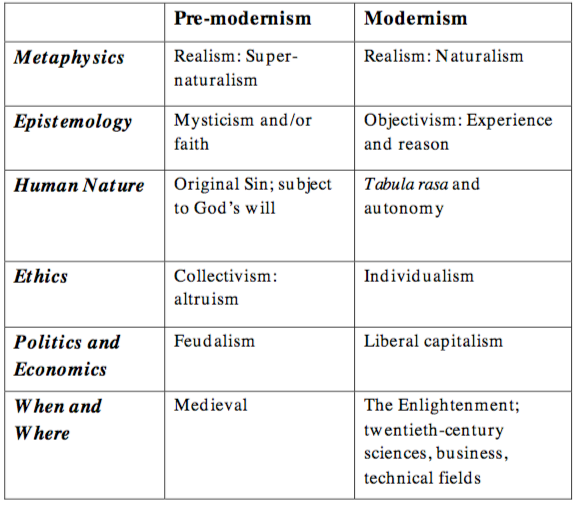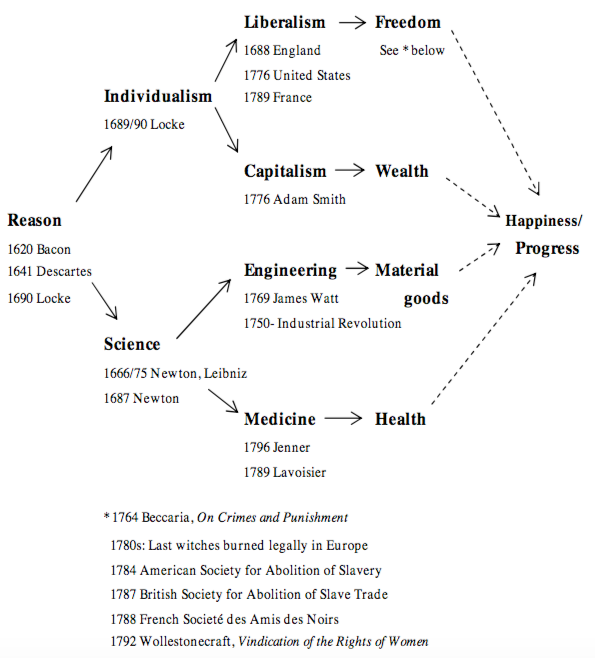
According to the philosopher, Stephen Hicks, modernism’s foundations are located in its profound confidence in reason and science. It is an era that revolts against the pre-modern reliance upon tradition, faith, and mysticism. Thinkers like Francis Bacon (1561-1626), René Descartes (1596-1650) and John Locke (1632-1704) are constitutive to modernism. Although it is difficult to point out exactly when modernism began and where it ended, we can roughly say that it’s a 17th to late 19th century era.
What do modern philosophers have in common?
Modern philosophers start from nature, instead of the supernatural which was common for Medieval philosophers. They departed from pre-modernist philosophers on many important areas.
Figure 1: contrasting pre-modernism with modernism.
Modern thinkers stress the importance of reason, science, and individual autonomy. They believe that the world can be explored through reason instead of faith in the supernatural, and that the individual is the unit of value instead of political, social or religious authorities.
Although modern thinkers disagreed among themselves and often held competing or conflicting ideas, Descartes’ account of reason is for example rationalist while Bacon’s and Locke’s are empiricist, they had never abandoned the central status of reason as objective and competent. This central status of reason eventually culminated in the Enlightenment.
Science
The Enlightenment thinkers laid the foundations of all the major branches in science. Isaac Newton (1666) and Gottfried Leibniz (1675) independently developed calculus.
Medicine
Science applied to the understanding of the human physiology led to medicine. The smallpox vaccine was developed in 1796. The advance of modern medicine led to a decline of infant mortality rates. In London, the death rate of children pre-5 years old fell from 74.5% in 1730-1749 to 31.8% in 1810-1829.
Engineering
Science applied to engineering led to the Industrial Revolution and an increase in the production of material goods. The increased production output per account of labour due to mechanization like the steam engine of James Watt (1769) resulted in more material wealth.
Ethical individualism
John Locke emphasized that reason is a faculty of the individual and maintains that ethical individualism should be at the center of social and political life. He reasoned for individual rights, political equality, a limited power of government, and religious toleration.
Liberalism
Applying ethical individualism to the realm of politics led to liberal democracy. The Western world had thus done away with feudalism. Racism and sexism were on its defense in the 18th century. Societies for the elimination of slavery were formed – in America in 1784, in England in 1787, in France in 1788 - a Declaration of the Rights of Women was written in 1791, and A Vindication of the Rights of Women in 1792. Liberty and equality for all individuals were marching forward.
Liberal capitalism
Applying ethical individualism to economics yields free market capitalism, which is based on the principle that individuals should be left free to make their own decisions about production, consumption, and trade. They are free to own capital. Hence, feudalism and mercantalism declined. Capturing insights of how free markets made everyone more wealthy, Adam Smith wrote in The Theory of Moral Sentiments (1759):
Every individual... neither intends to promote the public interest, nor knows how much he is promoting it... he intends only his own security; and by directing that industry in such a manner as its produce may be of the greatest value, he intends only his own gain, and he is in this, as in many other cases, led by an invisible hand to promote an end which was no part of his intention.
All-in all, modern philosophy made individuals become freer, wealthier, live longer, and enjoy more material comfort.
Figure 2: The Enlightenment vision.
Reference
Hicks, S. (2004). Explaining post-modernism: Skepticism and Socialism from Rousseau to Foucault
Really nice explanation of the modern, has made me visualise it much better. I'm not sure we have got to happiness, material wealth is not enough and now it seems people's freedom and reason is being curtailed by media/power interests. Health has definitely improved, but now I think we are at end of an age, where spirituality is coming back because philosophy and science has not managed to answer the purpose of living, seems more to it than just material comfort.
That is a very interesting observation. I believe that people's freedom and reason are being curtailed, mostly as a process of Postmodernism (the era after Modernism). In my next post, I will write more about his.
That's what I find interesting as well. Part of Nietzsche's critique of Modernism is that Reason and Science alone will not give us a purpose of living. It would lead to the "Death of God" - due to Reason people will find religion unbelievable. How should we deal with this, now that God does not give us a reason for living anymore? Nietzsche predicts an era of nihilism. This is an era in which people feel purposeless, and have no personal values. Instead, people will look for comfort in the herd, have no will power, and fool themselves in believing that their lives are magnificent. He calls these type of people "the Last Man". Nietzsche advises us to live the way of "the Overman" (Übermensch) to create our own values and purpose in life.
You've got Nietzche exactly right here as far as I understand him. The problem is, as far as I can see, is that corporate neoliberalism has installed oligopolies which look entirely like pre-modern feudalism.
And again, Nietzsche couldn't have imagined the scale of the problems facing us by mid-century; the least of which is a replacement energy source for oil--one which can scale present capitalist societies--that is presently nowhere in sight.....
I think it's clear, though, what replaced God: the monetization of everything which I argue is a very bad Idea...
I agree, never had this in school and to get such a nice wrap up is amazing!
This is all accurate, IMO, but we have now transitioned into global corporate oligarchy via neoliberal economics.
I think the other issue I'm having here is the issue of sustainability which is tied into limits to growth on a finite planet.
Most of these thinkers, as you mention, might be horrified at today's conditions, they lived when less a billion people were on the planet, seemingly unending resources, so they could be forgiven for being optimistic.
I, for one, don't share the optimism and believe history will prove my concerns as being correct.
A POST-post modernism has many many complex issues to solve and I'm not seeing much that makes me hopeful.
Socialization of the money supply would be a first necessary step....
Thank you very much for your comment!
I'm not so worried about the natural resources of our planets and the population. Milton Friedman expresses my views about this quite well:
What do you mean with socialization? I think that decentralization of the money supply is the right way to go as it distributes the power over the money supply to a greater number of people. That's the promise of cryptocurrencies.
LOL! Posting a video by one of the main proponents of neoliberal oligarchy isn't really going to cut it for me. The dismissal of serious, serious ecological problems is a dismal position to hold, IMO....
Friedman was obviously very well aware that The Rothschild's took over the creation of the money supply which has led to enormous wealth and power ending up in the hands of a very few. This is a case of the victors writing ideology!
I'm with you on the crypto but sit right in the middle of the 50/50 position on it. Time will tell what crypto is but I do hope for the best as far as it goes on that one.
Check out positivemoney if you've never heard of it.
I mean creating and distributing the money supply at creation evenly to everyone and preferable, not as a debt mechanism. I can see how the winners in the status quo would hate this idea......
I'd be interested to know your opinion of whether or not there's a correlation here, more of a chicken or egg scenario, with Sir John Glubb's, The Fate of Empires.
You can find the entire .pdf on line, my overviews left out a lot of information because I tried to pare it down for today's audience but the original is only 31 pages long.
My question is whether these changes, inlcuding Hegel's Sittlichkeit, are following the pattern that Glubb describes in terms of the de-evolution (my term for lack of a better one) from a societal to a more selfish viewpoint of the population as an empire passes through it's lifecycle.
Hi, thank you for your comment. I am not familiar with John Glubb's The Fate of Empires, but have just found a pdf and will read it. :)
I'm really interested in your opinion about this.
I can see just from the info I've picked up in your posts, that there has definitely been a progression of thinking along philosophical lines away from spirituality and the similarities to what I read in Glubb's work really struck me.
BTW, I'm more than open to you pointing out differences in opinion you may have. I expect they'll be logical and well thought out.
It seems like modernism is a double - edged sword.
While modernism allows the individual to thrive and share innovations that ultimately benefit society (e.g. cars and toilets) it only does so if people are motivated to help themselves first.
Otherwise, it turns into a free for all where anything goes and there are no morals sustaining altruistic behavior if we are largely taught that selfishness is the reason why tou should be altruistic.
This is amazing I'm always talking metaphysics and most people just say well what reality is just what it is.